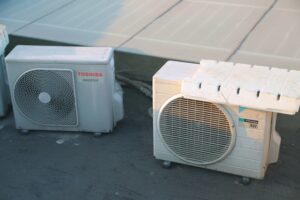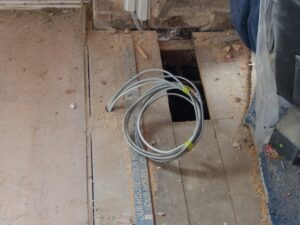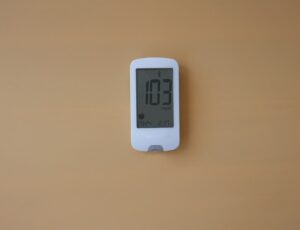When considering the replacement cost of an HVAC condenser, you might be wondering what you should expect to pay.
On average, a new unit can range anywhere from $1,200 to $4,200 if it’s not covered under warranty. This key component of your air conditioning system is vital in keeping your home or business comfortable, so it’s essential to understand the investment involved.
You may be asking why the prices vary so much.
Factors such as the brand, coil type, and SEER rating can influence the overall cost. Professional installation is another crucial component. Hiring experienced professionals like those at Excel Mechanical ensures that your condenser is properly installed and optimized for the best performance.
With our expertise in tailoring HVAC and plumbing solutions for both residential and commercial spaces, we aim to deliver exceptional quality and value.
When you’re ready to explore options for addressing your HVAC condenser needs, trust Excel Mechanical to help guide you through the process. Whether for your home or your business, our qualified professionals are here to assist.
We’re committed to ensuring you make the best choice for comfort and efficiency.
In this blog, you will learn:
- The various factors that affect the cost of your HVAC condenser.
- The types of condensers and which one might be best for your needs.
- How professional installation and maintenance can extend the life of your system.
Let’s get started!
Understanding HVAC Condensers
HVAC condensers play a crucial role in cooling systems by releasing heat absorbed from indoors to the outside environment.
Different types of condensers offer varying benefits, and each contains specific components that contribute to efficient air conditioning.
Let’s dive into the basics!
Function of an HVAC Condenser
An HVAC condenser is essential for cooling your home or business. It works with the compressor to release heat collected inside the building.
When refrigerant gas is compressed, it becomes hot and is sent to the condenser coil. Here, the condenser transfers heat to the outside air, turning the refrigerant into a liquid. This process lowers the refrigerant’s temperature, readying it to absorb more heat from indoors.
Without this function, your air conditioning system cannot work efficiently to keep your environment comfortable.
Types of HVAC Condensers
There are different types of HVAC condensers, including air-cooled, water-cooled, and evaporative condensers.
- Air-cooled condensers are common in residential air conditioning systems. They use a fan to blow air over the condenser coil to dissipate heat.
- Water-cooled condensers are typically used in commercial settings and involve water running through the system to carry away heat.
- Evaporative condensers combine air and water cooling but are less commonly used.
Each type has its benefits depending on your cooling needs and environmental conditions. Knowing this helps you choose the right system.
Components of an HVAC Condenser
An HVAC condenser consists of several key components: the compressor, condenser coil, fans, and fins.
- The compressor pumps the refrigerant throughout the system.
- The condenser coil is where the hot gas releases its heat.
- Fans help move air across the coils to assist in heat dissipation.
- Fins improve this process by increasing surface area.
Together, these components ensure your HVAC system runs efficiently and provides reliable cooling.
Factors Affecting HVAC Condenser Prices
Several key factors influence the cost of an HVAC condenser.
These include the unit’s capacity and size, the brand and quality, energy efficiency ratings, and the type of refrigerant used. Your specific needs and budget will determine the best options for you.
Let’s discuss them one by one!
Capacity and Size
The capacity and size of an HVAC condenser directly impact the price.
Larger homes or spaces need condensers with greater capacity, which often cost more. Capacity is measured in tons, with higher tonnage providing more cooling power. Consider the size of the area you need to cool carefully.
A unit too small for your space may overwork, leading to higher energy bills and wear. On the other hand, a unit that’s too large could waste energy.
Brand and Quality
Brands play a significant role in pricing.
Some brands are known for quality and durability, often with higher price tags. Investing in a reputable brand can save money in the long run through fewer repairs and a longer lifespan.
Excel Mechanical provides top-quality systems and prioritizes exceptional quality and value. By choosing trusted brands, you’re more likely to enjoy reliable performance and efficiency over time.
Energy Efficiency Ratings
Energy efficiency is measured by the Seasonal Energy Efficiency Ratio (SEER) rating. Higher SEER ratings typically mean the unit is more efficient but may also increase the price.
Investing in a more efficient condenser can reduce energy bills over time. When evaluating options, balance the initial cost with potential savings from lower energy use.
Type of Refrigerant Used
Refrigerants are substances used in cooling systems. Environmental impacts and efficiency depend on the type used.
- Older refrigerants, like R-22, are being phased out due to environmental concerns, potentially raising the cost of units that still use them.
- Modern refrigerants, such as R-410A, are more eco-friendly and efficient, although they might initially be more expensive.
- Newer refrigerants improve system efficiency and lower environmental footprints, making them worth considering for your next HVAC purchase.
Average Cost Range for HVAC Condensers
When budgeting for HVAC condensers, costs vary for residential and commercial needs. Different factors, including size, type, and installation complexity, influence these costs
Now, let’s talk about the price cost.
Residential HVAC Condensers
For residential setups, condenser prices typically range from $1,025 to $4,775. These variations depend on factors like the condenser’s size and efficiency.
- Labor costs for installation can add $300 to $1,200 to the total, influenced by unit size and access difficulty.
- Regular maintenance, like coil cleaning, can cost between $100 and $400, keeping your system efficient and extending its lifespan.
Commercial HVAC Condensers
Commercial HVAC condensers generally cost more than residential units due to their larger size and higher capacity.
Prices often range from $3,500 to $7,500 or more, which reflects the need for robust systems to cool larger spaces.
Installation labor for commercial units can range from $500 to $3,000, depending on the complexity and size of the system required.
Additional Costs to Consider
When planning for an HVAC condenser replacement, it’s crucial to consider various additional costs. These could include installation services, ongoing maintenance, potential repairs, and even warranty extensions.
Installation Services
The installation cost can vary depending on factors like the complexity of the system, location, and the specific services provided.
Generally, HVAC technicians charge between $100 and $200 per hour for installation labor. You might also face additional charges if modifications to existing ductwork are needed.
Choosing a reputable company ensures professional installation tailored to your system’s unique requirements, which maximizes efficiency and longevity.
Maintenance and Repairs
Regular maintenance is essential to keeping your HVAC condenser operating efficiently.
Routine maintenance might include cleaning the coils, checking refrigerant levels, and inspecting electrical components. While the costs of such services can vary, routine checks are often more affordable than emergency repairs. In contrast, neglecting maintenance can lead to costly breakdowns.
By opting for Excel Mechanical’s maintenance plans, you receive expert service from professionals committed to exceptional quality and value, ensuring your system runs smoothly year-round.
Warranty Extensions
A warranty extension can be a wise investment for your HVAC condenser.
Extended warranties typically cover significant repairs and sometimes even routine maintenance for an additional period beyond the standard warranty. This can provide peace of mind and potentially save you from unexpected costs.
When selecting a warranty plan, consider the terms and what’s covered. It’s beneficial to discuss your options with a trusted provider who can offer plans that suit both residential and commercial needs, ensuring the best protection for your investment.
Selecting the Right HVAC Condenser
Choosing the right HVAC condenser requires careful consideration of various factors, such as energy efficiency, noise levels, and compatibility with your existing system.
Your unique needs and budget must also guide the decision process.
Here is how you can select the right HVAC condenser for yourself:
Assessing Your Needs
To begin, determine the size of the condenser you need.
The wrong size can lead to inefficiency or mechanical issues. Consider the energy efficiency of different models. Look for units with a high SEER (Seasonal Energy Efficiency Ratio) rating, which indicates better performance and lower energy costs.
Noise levels can also be crucial, especially if the unit is near living or sleeping areas. Check for models that offer quiet operation without compromising performance. Additionally, consider long-term costs like potential repairs and maintenance.
Incompatible units can cause more harm than good, disrupting functionality and comfort.
Consulting with Professionals
Consulting with experts can help ensure that you make the right choice.
HVAC professionals can assess your home’s requirements and suggest models that fit your budget and needs. They can provide insights into the latest technologies and models available.
When seeking professionals for residential and commercial needs, consider Excel Mechanical. We excel at providing personalized solutions, ensuring exceptional quality and value tailored to your situation.
Focusing on the best possible systems, we stand out for professional service and reliability. We understand that each client has unique needs and financial considerations.
Installation Best Practices
When installing an HVAC condenser, a few key factors are important to ensure efficiency and longevity.
- Professional installation is highly recommended. This helps make sure the unit meets all local building codes and regulations.
- Placement is crucial. The condenser should be placed on a level surface away from obstructions. Ample space around the unit ensures good airflow and easy access for maintenance. Proper location can improve efficiency and extend the life of the system.
- Consider the climate of your area. Weather conditions can influence the performance of your condenser. For instance, placing the condenser in a shaded area might help keep it cool on hot days, boosting efficiency.
- It’s essential to use quality materials during installation. High-grade materials can prevent future issues and reduce the need for frequent repairs. This includes using durable fasteners and protective coatings to safeguard against corrosion.
- Lastly, consider noise levels. Placing the unit away from frequently used areas, like patios or windows, can help minimize disturbance. Proper installation, like using vibration pads, can also reduce noise.
Potential Rebates and Incentives
When considering a new HVAC condenser, exploring potential rebates and incentives is wise.
The Inflation Reduction Act of 2022 offers significant rebates for high-efficiency systems. You could receive up to $8,000 for a heat pump, $1,750 for a heat pump water heater, and $840 for an electric HVAC system.
Your household income should be up to 150% of the area median income to qualify. The Energy Efficient Home Improvement Credit also allows you to claim $1,200 annually for certain energy-efficient upgrades. For specific equipment like qualified heat pumps or biomass stoves, you could claim up to $2,000 each year.
Here’s a quick list of available credits and rebates:
- Up to $8,000 for heat pumps
- Up to $1,750 for water heaters
- Up to $840 for electric HVAC systems
Exploring these options can lead to significant savings.
Excel Mechanical strives to provide the best HVAC system to suit your needs and budget. Our professional team ensures exceptional quality and value, making us a top choice for residential and commercial services.
For more savings, some upgrades might qualify for a 30% tax credit, up to $2,000. Consider optimizing your home insulation to maximize efficiency and potential credits. Our expertise ensures you get the best value and service when navigating these incentives.
Frequently Asked Questions
When it comes to replacing or maintaining your HVAC condenser, you might have several questions. Understanding the factors that influence costs, lifespan, and whether or not replacement is worth it can be confusing. Let’s address some of the most common queries to help guide you through this process.
What is the cost of replacing an AC condenser in a vehicle?
The cost of replacing an AC condenser in a vehicle typically ranges from $300 to $900, depending on the make and model of the car. Labor rates can vary, adding to the total expense. Choosing a reliable mechanic is essential to ensure the new part’s quality service and longevity.
What is the typical price range for replacing an HVAC condenser in residential properties?
Replacing an AC condenser typically costs between $1,050 and $5,000 for residential HVAC systems. Factors like the size and type of the unit and labor charges can impact the total cost. Most homeowners expect to spend about $2,900 on average for this replacement.
What factors influence the cost of an AC condenser unit replacement?
Several factors determine the cost of replacing an AC condenser unit. The size and type of the unit play a major role, along with the labor required and accessibility of the installation site. Seasonal demand can also affect pricing, as HVAC services are often more expensive in peak times like summer.
How does the cost of an AC condenser compare to the cost of a compressor replacement?
An AC condenser tends to cost less than replacing a compressor. While condenser replacement generally ranges from $1,050 to $5,000, the compressor can cost significantly more due to its central role in the HVAC system. It’s essential to assess both parts when considering repairs or replacements.
Is it cost-effective to replace an AC condenser unit on an older system?
Replacing an AC condenser on an older system can be cost-effective if the other components are in good condition. However, replacing the entire unit might be more economical for very outdated systems. Consultation with professionals like Excel Mechanical can help you make the best decision.
What is the lifespan of an AC condenser, and how does it impact replacement decisions?
An AC condenser typically lasts 10 to 15 years. Its lifespan impacts replacement decisions, as a unit nearing the end of its life may justify a replacement over a repair. Experts can evaluate whether repairing or replacing the condenser is the best option.




